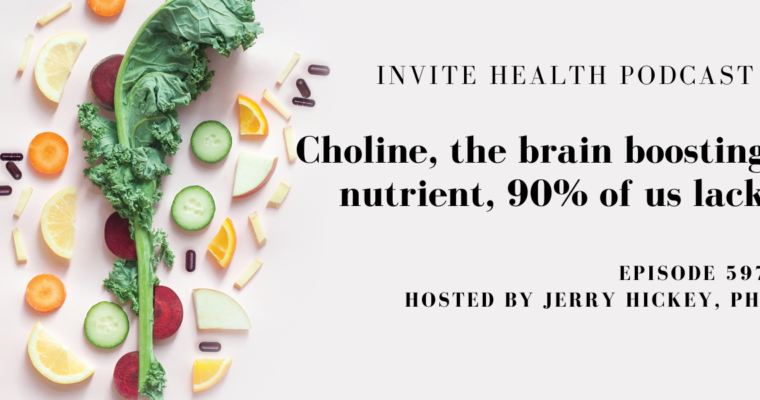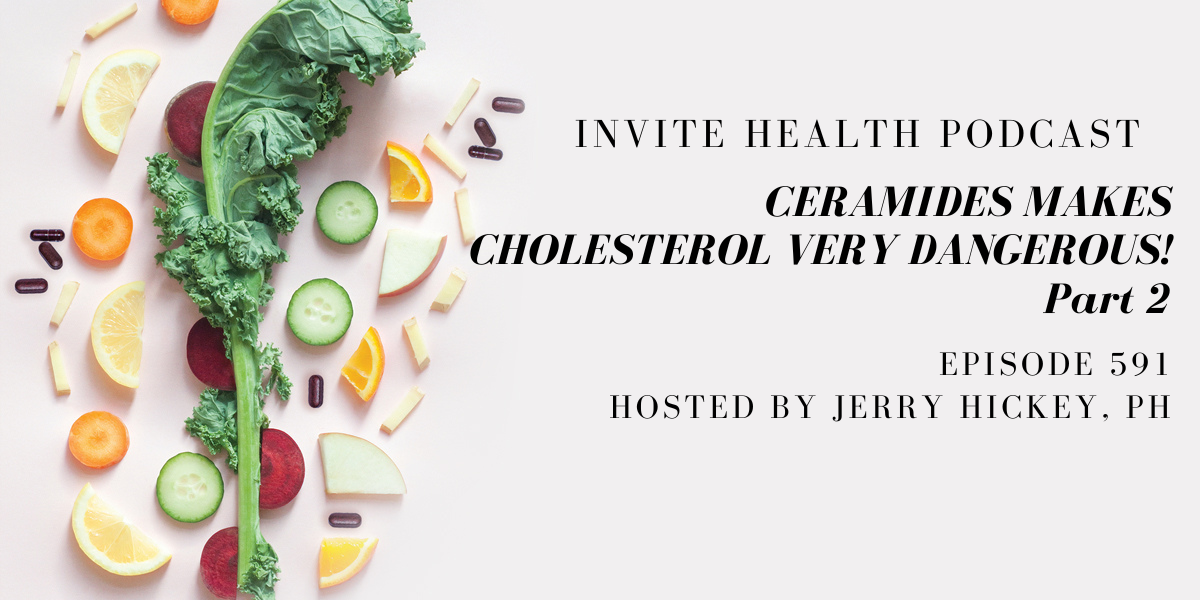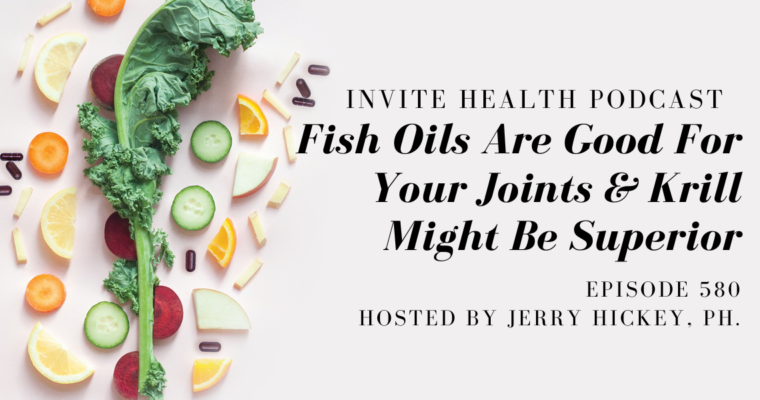cholesterol
Subscribe Today!
Please see below for a complete transcript of this episode.
CERAMIDES MAKES CHOLESTEROL VERY DANGEROUS, PT 2-INVITEⓇ HEALTH PODCAST, EPISODE 591
Hosted by Jerry Hickey, Ph.

*Intro music*
InViteⓇ Health Podcast Intro: [00:00:04] Welcome to the InViteⓇ Health podcast, where our degreed health care professionals are excited to offer you the most important health and wellness information you need to make informed choices about your health. You can learn more about the products discussed in each of these episodes and all that InVite Health has to offer at www.invitehealth.com/podcast. First time customers can use promo code podcast at checkout for an additional 15% off your first purchase. Let’s get started.†[00:00:34] cholesterol
*Intro music*
Jerry Hickey, Ph: [00:00:40] Welcome back to part two of my episode ceramides, these fats make cholesterol extremely dangerous. Ceramides are a type of fat that our body makes. And there’s different forms of ceramides and they’re okay at normal levels, in fact, they make your skin and are involved with your cell production, etc., but at very elevated levels, they’re extremely dangerous for your heart. And we discussed, Dr. Jeff Meeusen he’s the co-director of the cardiac lab at the Mayo Clinic. And Dr. Meeusen says that elevated LDL or overeating causes ceramides to build up in our tissues. So LDL is notoriously titled bad cholesterol. It’s not always bad. You need it for certain things. But when it’s elevated or goes rancid, it’s very dangerous, especially the small, dense variety of it, dense meaning, it’s heavy, so it floats out of our blood because of gravity, it is attached in the blood vessel walls and because it’s a small molecule, because it has these small molecules in it, any cracks in the blood vessel walls any opening in the blood vessel walls are can easily insinuate itself into them. So what’s the problem with ceramides, the ceramides literally shoves the LDL, bad cholesterol into the walls of our blood vessels. And according to the Mayo Clinic, 50 times worse than usual. In other words, if LDL, bad cholesterol has a propensity for attaching and damaging our blood vessels and causing a buildup of the plaque that leads to hardening of the arteries, it’s 50 times worse if you’re elevated in ceramides.†[00:02:17]
[00:02:18] So I said in part one of this episode that elevated ceramides, on their own, are monsters for our hearts and they actually affect our survival and inflammation causes them to increase the kind of inflammation you’d see in diabetes or maybe kidney disease or liver disease, not the temporary inflammation you get from an infection that that goes away quickly, hopefully. But also obesity increases ceramides, eating a lot of unhealthy fats, eating a lot of sugary foods like donuts. They all increase ceramides, overeating in general, obesity, blood sugar problems, like I said, inflammation, elevated LDL. All of these increase ceramides, unfortunately. So it’s just a process of aging. That’s why it’s so important for us older adults to have a lot of antioxidants to help protect our blood vessel walls and antioxidants like what’s in blueberries and broccoli and green tea and a little bit of cocoa, if it’s not damage into milk chocolate, things like that. Antioxidants, they help protect us. Vitamin C, natural vitamin E, tocotrienols, version of vitamin E, all those help protect us.†[00:03:37]
[00:03:39] But also you want your bad cholesterol down when you’re older because the ceramides are going to be there. So the bad cholesterol literally becomes more dangerous as we grow older. So we really should discuss at this point what lowers ceramides. And just to cover quickly the Mayo Clinic and many other academic research institutions of high caliber, said that elevated ceramides are involved with severe heart attacks, strokes, severe build up of cholesterol, the blood vessel walls. There’s even evidence for Alzheimer’s disease in older people. Our T cells don’t work well to fight cancer. It leads to massive heart attack strokes, the need for bypass surgery and open heart surgery and stenting and also, unfortunately, mortality, not just morbidity, which is disease, but mortality, which is the end. So you really want to lower your ceramide level.† [00:04:36]
CERAMIDES MAKES CHOLESTEROL VERY DANGEROUS>>LISTEN NOW!
[00:04:37] Now, just a word on this. LDL once again is the number one fat that builds up in our arteries that leads to atherosclerosis and arteriosclerosis, etc., you know, hardening of the arteries and blood vessel walls. And a spike, tremendous success which statins for lowering LDL cholesterol, heart disease still remains the number one cause of death everywhere in the planet. So we have to look at other things involved here. We know inflammation is part parcel of these issues. That’s something you could get checked out, I’ve done a couple of podcast episodes on something hs-crp, which is something that can be used for a marker of chronic low grade inflammation that can damage the kidneys or the brain or the heart. We’ve spoken about different kinds of fat previous in episodes, like triglycerides. Now we’re talking about ceramides.† [00:05:32]
[00:05:33] So this is another thing, and by the way, a good diet exercise, not smoking, not drinking a lot of alcohol. All of these things tend to lower all of these bad things. But we need a little bit more help with ceramides. Now, they have found that two types of statin drug do help lower ceramides, rosuvastatin, which is Crestor. If I had to take a statin, that’s the one I would take. I would take about five milligrams a day because, five milligrams a day doesn’t seem to be a problem. It doesn’t tend to make people fatigued, it doesn’t have an effect on the liver or anything like that. It seems to be fine and it does a great job of pushing down the bad cholesterol. A tiny, tiny, tiny bit raises the good cholesterol, but not very significantly. But now they’re finding that rosuvastatin lower ceramides. So that’s another plus. And that might be why out of all the statins, rosuvastatin along with Atorvastatin, seem to be the best for keeping patients alive because Atorvastatin also has a slight propensity for lowering ceramides.† [00:06:37]
[00:06:48] When you look at evidence of something helping, you always want to look at the cell evidence. You always want to look at animal evidence of the animals not being mistreated or being put in pain, etc. So these are researchers from Spain, a bunch of different academic research institutions in Spain. And by the way, if you’ve never been to Spain, it’s a gorgeous country, and the history and the architecture and the food is just amazing. And the art, the arts amazing. In any event, getting back to the podcast episode, researchers from Spain published their findings in the journal Food and Function. And they they were feeding animals a lot of fats and sugar. So that’s not a terrible thing. It’s not like they were torturing the animals. They were feeding the animals fats and sugars. And I saw that, ceramide levels were increasing, so they gave them fish oils in their chow and they found that the ceramide levels were dropping. And this is not the only evidence is mounting evidence now, accruing evidence that fish oils lower ceramides, so that’s another feather in the cap of fish oils. We know that fish oil do help preserve muscle and bone. They are healthy for women’s breasts and your colon, they’re certainly healthy for your heart. They lower the risk of sudden cardiac death, which is amazing. They’re fantastic for your brain and they’re needed by your eyeballs. They need for color vision and fine vision. They are needed for memory and a good mood. Mental health issues. So fish oils are really good supplements. Just make sure you get a really high quality fish oil because you want it to be fresh and clean. † [00:08:27]
[00:08:30] So as ceramide levels dropped in these animals, the ability to control their blood sugar improved. And you know, in part one of this episode, we spoke about ceramides being part parcel of blood sugar issues. So here we have animal evidence that the animals that were becoming chunky and their cholesterol was going up and everything was going up and their ceramides were going up and they were losing control of their blood sugar, which is leading towards diabetes in the animals, simply giving them fish oils, lowered ceramides, and they could see a direct connection. As ceramides levels dropped, blood sugar control improved. So the Karolinska Institute is kind of like our Tufts University or our Johns Hopkins. They do a lot of high quality research, the Karolinska Institute in Stockholm, Sweden. They hand out different Nobel Prizes for medicine and physiology, I believe, but they hand out several Nobel Prizes. So they’re highly regarded and they worked with the University of Bergen, which is in Norway, and they published their findings in the Journal Lipids in Health and Disease. And they gave mice, once again in mice, a high fat diet, which is not a terrible thing. They’re not torturing them, roasted, not in pain or anything. They didn’t cut off their tail, so they gave mice, a high fat diet and they found that, ceramide levels were increasing. So then they gave some of the mice, fish oils or krill oil, and both of them were lowering ceramide levels. Fish oils lowered ceramide levels. But the krill oil at equal dosages was superior to fish oil for lowering the level of ceramides. I’m glad I take two Krill oil every day with my breakfast. Just so happens my wife and I, do have a lot of fish, a lot of different kinds of fish. But I still take the Krill every morning because you want that DHA for your memory. You want the EPA, DHA, for your brain, and you want it for your eyeballs. Additionally, Krill oil has a little bit of DPA, which is amazing for the heart. And Krill oil has other things useful for the memory like astaxanthins, phosphatides and choline, it gets into your brain, so I take Krill, fish oil is fine. I think it’s a great supplement, I just prefer Krill.† [00:10:54]
FISH OILS ARE GOOD FOR YOUR JOINTS & KRILL MIGHT BE SUPERIOR- INVITE HEALTH PODCAST, EPISODE 580>>LISTEN NOW!
[00:10:57] So here’s a study from Yale University School of Medicine and Howard Hughes Medical Institute. It’s published in the American Journal of Physiology, Endocrinology and Metabolism. And they found that fish oils, yes, they lower triglycerides, which is a greasy fat that when it’s elevated, it’s terrible for your heart, it’s terrible for your liver, and it causes strokes. But besides lowering triglycerides, it lowered ceramide levels and this led to correcting elevated blood sugar. So there’s a connection now, you know, I didn’t even do my intro. You know, my name’s Jerry Hickey. I’m a nutritional pharmacist, and you can find all the Invite Episodes wherever you listen to podcasts or just go for free, by the way, or just go to invitehealth.com/podcast and you can get all of our podcasts all in one place. And you can also find invite on Facebook, Twitter and Instagram at Invite Health. So when you listen, if you could subscribe and leave a review, it would be helpful for us. But let’s get back to this. I was so psyched about it, I didn’t even do the intro. That’s okay. Who cares about the intro?† [00:12:12]
[00:12:24] So we are concerned about ceramides, just to reiterate, because they increase your high blood pressure, they increase with diabetes, they increase with obesity, the increase with inflammation, increase with age, they increase with eating too many fats and sugars and they cause heart damage. And if they’re really elevated, they lead to fatal heart attacks. And I said that statins can help lower them and fish oils help lower them and krill oil, not a lot of data on krill oil yet with ceramides. But that one study was very, very positive. Oh, and by the way, besides several statins, Atorvastatin and Rosuvastatin, lowering your intake of bad fats and sugars helps lower ceramides, cutting your calories, aerobic exercise and fish oils. They all help lower ceramides, so I just want to repeat these things, they are so important. So eating incorrectly, especially if you overeat, leads to heart disease, diabetes, obesity, many things, it contributes to Alzheimer’s disease, even bone loss and pain, etc. And eating correctly reduces inflammation, supplies antioxidants. Eating wrong leads to bad things, including cancer, eating correctly, good things. I think fish oil should be part of that. They’ve seen, it was, uh, researchers at the University of Manchester in England, University of London. It’s published in the journal Biochemical Pharmacology that, even people who choose a poor diet, high in cholesterol and sugar, if they take fish oils, it helps prevent the inflammation, it helps prevent the rise in triglycerides and it helps prevent the rise in ceramides. So let’s go on with some of these fish oil studies. And in fact, let’s let’s talk about related studies. I mean, fish oils also lowered the kind of inflammation related to over eating, related to diabetes, related to obesity. The FDA actually allows a health claim for fish oils with high blood pressure, recently, and it’s based on 70 different studies. So there’s a new study from the Journal Frontiers in Nutrition. It’s a meta analysis of ten existing studies that fish oils help lower high blood pressure. More importantly, dozens of studies show that it reduces the risk of sudden cardiac death, which is related to high blood pressure. Now, there are several other studies that fish oils lower ceramides. I think that that’s a very positive thing to do. So I want to thank you for listening to part two of our episode. How ceramides make your cholesterol exceedingly dangerous. Exceedingly dangerous. My name is Jerry Hickey. I’m a nutritional pharmacist. And let me just reiterate, you can find all of our episodes for free wherever you listen to podcast or go to Invitehealth.com, where it says podcast. So thanks for listening. Hope to see you next time, on another episode of the InViteⓇ Health podcast, Jerry Hickey signing off. †[00:15:33]
*Exit Music*












